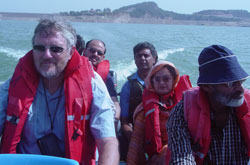
Fieldwork on Mangla Lake, Pakistan
Charles Darwin University (CDU) researchers are working with colleagues from Punjab University and government agencies in Pakistan to help solve a critical water problem. Over the last 40 years, sediment has been building up at the bottom of the giant Malaga Dam reservoir on the river Jhelum.
Part of the Indus river basin system, the Malaga Dam was built in 1967 with a storage capacity of 5.88 million acre feet. Since its construction, a large quantity of sediment has been continuously transported into the reservoir reducing its storage capacity by 20 per cent. This has had a major impact on irrigation and electricity generation.
Professor Bob Wasson and Dr Waqar Ahmad from CDU recently visited Pakistan to present seminars highlighting a research plan to reduce sediment transportation into the Manga Dam. They were enthusiastically received by the Pakistan government and all parties agreed to proceed with the plan.
Professor Dr Atta-Ur-Rahman, Federal Minister and chairman, Higher Education Commission also offered CDU twenty PhD scholarships for students from Pakistan. CDU has accepted the offer and the final selection of students will occur in August 2006.
The research project also includes the Tarbela Dam in the Indus catchment area which is also suffering from a build up of sediment. The construction of a further dam upstream will assist in reducing the problem but requires careful planning and construction.
The research will determine the major sources of sediment by combining erosion modeling, GIS, Remote Sensing, geomorphology, hydrology and sediment source tracing.